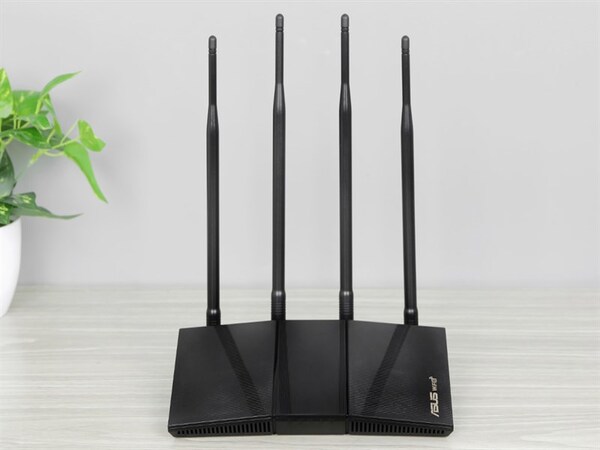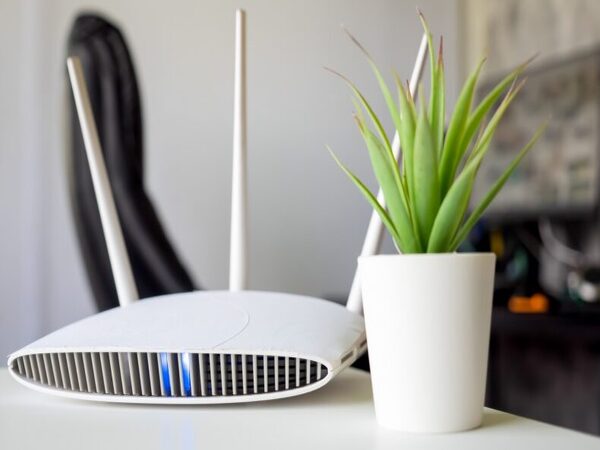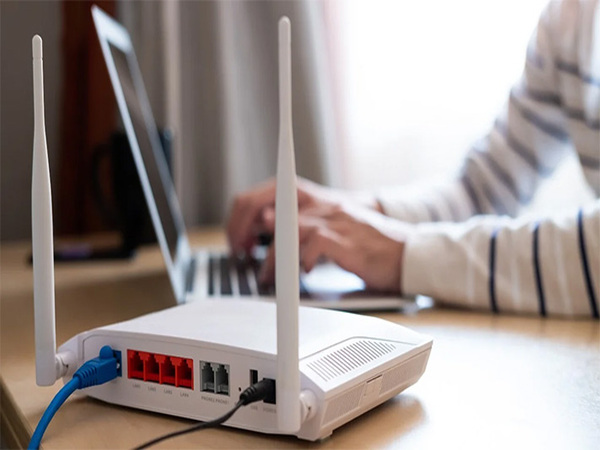A WiFi Router is a crucial device in a network system, helping to provide wireless internet connection for multiple devices at the same time. However, alongside the benefits, routers also have certain limitations. So, what are the advantages and disadvantages of a WiFi Router? Let’s explore in detail with Genfarmer to better understand the pros and cons of a WiFi Router as well as the outstanding features it offers!
What is a WiFi Router?

A WiFi Router is an important network device that broadcasts a wireless internet signal, allowing multiple devices such as phones, laptops, tablets, smart TVs, etc., to connect and access the network conveniently. The WiFi Router acts as an intermediary between the modem and other devices, receiving the internet signal from the modem and distributing that signal via WiFi waves or wired LAN ports.
In terms of operating principle, a WiFi Router not only helps transmit data but can also manage the data flow between devices on the same network, support network security, prevent unauthorized access, and optimize internet usage performance. Modern WiFi Routers are often equipped with many advanced technologies such as dual-band (2.4GHz and 5GHz), WiFi 6, MU-MIMO, and Beamforming to increase speed, expand coverage, and reduce latency during use.
Advantages and disadvantages of a WiFi router and its outstanding features
Advantages of a WiFi router

A WiFi Router is an indispensable device in every home and business today. Thanks to modern technology, a WiFi router offers many outstanding advantages such as convenient wireless connectivity, stable network speed, and wide coverage. Here are the benefits that a WiFi router brings to daily life.
Flexibility and mobility
The biggest advantage of a WiFi Router is its wireless connection capability. You are no longer “tied down” by cumbersome network cables. With WiFi, you can freely move your devices (phone, laptop, tablet…) within the router’s coverage area while maintaining a stable internet connection. This is particularly useful in homes, offices, coffee shops, airports, and many other public places.
Connect multiple devices simultaneously
A single WiFi Router can simultaneously serve internet connections for many different devices in a home or office. From smartphones, tablets, laptops, Smart TVs, game consoles, to smart home devices like lights, speakers, robot vacuums… All can connect and use the internet through a single WiFi Router, helping to save costs and simplify the network system.
Easy to install and use
Compared to other complex network devices, a WiFi Router usually has a fairly simple installation and configuration process. Most modern Routers have an intuitive, easy-to-understand management interface, accompanied by detailed installation instructions. Even users with little technical knowledge can set up and use a WiFi Router easily on their own.
Share internet connection
A WiFi Router allows you to share a single internet connection among multiple users. Instead of each person having to subscribe to a separate internet plan, you only need a single connection and one WiFi Router for everyone in the family or office to access the internet together. This helps save significant costs, especially for large households or small businesses.
Popular and easily accessible
WiFi technology has become extremely popular and is widely supported on most electronic devices today. You can easily find and buy a WiFi Router at any electronics store, supermarket, or on e-commerce sites with a wide range of prices and brands, suitable for everyone’s needs and budget.
Disadvantages of a WiFi router

Besides the advantages, the disadvantages cannot be overlooked when evaluating the pros and cons of a router. Some limitations of a WiFi router include:
Security issues
Because WiFi signals are transmitted wirelessly through the air, they are more susceptible to interference and intrusion than wired connections. Although modern WiFi Routers are equipped with many security features like WPA2/WPA3 encryption, firewalls, etc., there is still a potential risk of cyber-attacks and personal data theft if users do not configure security correctly or use weak passwords.
Limited coverage range
WiFi signals have a certain coverage range and will weaken when encountering obstacles such as thick walls, metal objects, or being too far from the Router. This means that in locations far from the Router or heavily obstructed, the WiFi signal may be weak, unstable, or even disconnected. To overcome this, you may need to use additional WiFi range extenders (Repeater, Mesh WiFi).
Susceptible to interference
WiFi signals operate on radio frequencies and can be interfered with by other wave sources such as microwaves, cordless phones, Bluetooth, or neighboring WiFi networks. Interference can reduce the speed and stability of the WiFi connection, especially in environments with many electronic devices or multiple WiFi networks operating nearby.
Speed may not be as stable as a wired connection
Under ideal conditions, WiFi speed can be comparable to or even higher than a wired connection. However, in reality, WiFi speed is often affected by many factors such as distance, obstacles, interference, the number of concurrently connected devices, etc. Therefore, a wired LAN connection is still often preferred for applications that require large bandwidth and high stability, such as online gaming, streaming 4K video, or transferring large files.
Dependent on power source
A WiFi Router needs a continuous power supply to operate. If the power goes out, your WiFi network will be interrupted. This can be inconvenient in the event of a sudden or prolonged power outage.
Overall, when considering the pros and cons of a router, you need to weigh them carefully to choose a device that suits your usage needs. A good WiFi router will help you have a more stable and secure network experience.
Outstanding functions of a WiFi router

A WiFi Router is not just a device that broadcasts the internet but also integrates many important features to optimize the connection experience. However, to use it effectively, you need to clearly understand the pros and cons of the router, thereby choosing the appropriate device. Below are the outstanding functions of a WiFi Router.
WiFi Broadcasting (Wireless Access Point)
This is the most basic and important function of a WiFi Router. The router acts as a wireless access point, emitting a WiFi signal so that devices within its coverage range can find and connect to the network.
Internet Sharing
The WiFi Router receives an internet connection from the Modem (e.g., fiber optic Modem, ADSL Modem) and shares this connection with all devices connected to it. The router acts as a central hub for distributing the internet to every “corner” of the home or office network.
Network Management
A WiFi Router can manage the local area network (LAN) it creates. The router automatically assigns IP addresses to connected devices (via the DHCP protocol), allowing these devices to “communicate” with each other and with the internet. The router can also control network traffic, prioritizing bandwidth for certain devices or applications (QoS – Quality of Service).
Network Security
WiFi Routers are equipped with security features to protect your network from unauthorized access and threats from the internet. Common security features include:
- Firewall: Blocks unwanted connections from the outside into your network.
- Wireless Encryption (WPA2/WPA3): Encrypts wireless data transmission between the Router and devices, preventing eavesdropping.
- Access Control: Allows you to limit which devices are allowed to connect to your WiFi network (e.g., MAC address filtering).
Data Routing
The true “Router” function of a WiFi Router is its ability to route data. The router determines the most optimal path for data packets as they travel between your local network and the internet, or between different devices within the local network. The router acts as a “traffic coordinator” for data in the network.
DHCP Server
As mentioned above, WiFi Routers often integrate a DHCP server to automatically assign IP addresses to connected devices. This simplifies the network configuration process and prevents IP address conflicts.
NAT (Network Address Translation)
Most WiFi Routers use NAT technology to allow multiple devices in the local network to share a single public IP address when accessing the internet. This not only helps conserve public IP addresses (which are limited) but also enhances network security, as devices inside the network are “hidden” behind the router’s public IP address.
Although a WiFi Router offers many benefits, there are also some drawbacks to consider. Network performance can be affected by thick walls, long distances, or interference from other devices. Additionally, some high-end routers have complex configurations, requiring users with technical knowledge to install and optimize. Therefore, understanding the pros and cons of the router will help you choose the device that suits your needs.
Reasons to use a WiFi Router

In the digital age, the internet has become an indispensable part of daily life. To have a stable and efficient network connection, a WiFi router plays a crucial role in distributing and maintaining the internet connection. However, before deciding to use one, you should clearly understand the pros and cons of a router to make a suitable choice.
Convenient wireless network connection
A WiFi Router eliminates the dependence on traditional network cables, allowing devices like phones, laptops, and tablets to easily access the internet anywhere within the coverage area. This creates flexibility in use and enhances the aesthetics of the workspace or living area.
Share internet for multiple devices simultaneously
One of the biggest benefits of a WiFi Router is its ability to connect and share the internet for multiple devices without complex cables. This is very useful for households, coffee shops, and offices where many people need to access the internet at the same time.
Improve network speed and performance
Modern WiFi Routers are equipped with advanced technologies such as Dual-band, MU-MIMO, and WiFi 6, which help increase internet access speed, reduce latency, and improve performance when using applications that require large bandwidth, such as streaming movies, online gaming, or online meetings.
More secure network security
A WiFi Router not only provides an internet connection but also has security features such as WPA/WPA2/WPA3 encryption, a firewall, and access control to protect personal data from network threats. This helps users feel more secure when accessing the internet, especially in a work environment or during online transactions.
Expand internet coverage range
Despite its many benefits, a WiFi Router also has some disadvantages. For instance, network performance can be affected by thick walls, long distances, or interference from other devices. Additionally, setting up and maintaining some high-end routers can be complicated for users without much experience. Therefore, understanding the pros and cons of the router will help you optimize the use of this device effectively.
Conclusion
Choosing a WiFi Router that fits your usage needs requires you to clearly understand the pros and cons of the router to make the most of the device’s outstanding features. Hopefully, this article has helped you get an overview of the pros and cons of a router, thereby making the right decision when equipping your space with a WiFi Router!











